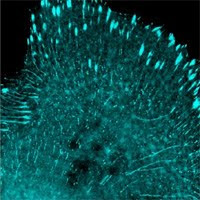From the large number of recent publications using GFP-Trap
beads, it appears that GFP-Trap is on the way to becoming one the most
popular tags for co-IP thanks to its unparalleled “cleanness” of
precipitated protein bands and its quantitative binding capabilities.
As described previously, the antibody conjugated on the GFP-Trap beads
is a single-domain
antigen binding module from camelid single-chain antibodies. Termed
VHH, this domain is only ~12 kD and can fit into structures that other
types of antibodies cannot. We have successfully created VHH antibodies
against a number of neural factors as a research project for the
NIDA/NIH.
VHH
proteins are often called nanobodies as a result of their size (1.5 –
2.5nm) and binding affinity ( GFP-trap has a binding affinity of
0.59nM). In addition to their use for co-IP, VHH antibodies have proven
themselves as a resilient tool for various other applications . Anti-GFP nanobodies, for example, are currently used to enhance the fluorescence of GFP (GFP-trap booster utilizes the same VHH binding antibody coupled to a fluorescent dye); others have used VHH antibodies
that can insert into certain part of GFP to dim the fluorescence signal
. More recently, Ries et al. published in Nature Methods that the
anti-GFP nanobodies offered a simple and versatile method for
super-resolution imaging (i.e. PALM)-previously super-resolution imaging
requires photoconvertible fluorescent proteins (such as Eos, mClavGR2).
With dye-conjugated nanobodies, generating fusions to these newer FPs
is no longer needed, however, using the nanobody super-imaging method
requires fixing and permeabilizing the cells.
When
using anti-GFP VHH reagents you need to be aware that other fluorescent
proteins can also be recognized, if they were derived from the avGFP
(jellyfish GFP). Also, some GFPs are not recognized if they are from
another species, or engineered such as our mWasabi.
We are producing newer and brighter GFP/YFPs based on the lancelet YFP
protein to offer alternative series that will not be cross-recognized
by the GFP-Trap antibodies.




No comments:
Post a Comment